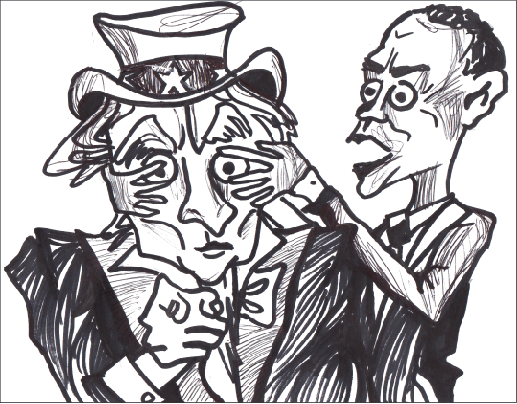As seen in the January 24 issue.
Dami Kim, culture editor
“Government exists to protect us from each other. Where government has gone beyond its limits is in deciding to protect us from ourselves,” President Ronald Reagan noted in “The Age of Turbulence,” former Federal Reserve Chairman Alan Greenspan’s memoir.
Though this statement may seem like an accurate justification for government control, Big Brother still does exist in America, a country that preaches freedom of speech and equality for all. Surprisingly, Uncle Sam is watching us more closely than we once thought.
As technology advanced and our standard of living rose, the government’s tactics of spying into our lives improved as well. The controversial issue of privacy surveillance in 2013 proved this to be true.
The saga of Edward Snowden, a former intelligence contractor who leaked National Security Agency’s 20,000 documents and fled to Russia for temporary asylum, happened just months ago. Snowden did not have to use any sophisticated software or break down any computer firewall. He simply used a few thumb drives to exploit the National Security Agency’s pandora’s box that released forbidden information to the public.
Some of this information included NSA’s black budget that targeted many countries: China, Russia, Iran, Cuba and Israel, as top priority countries. The European Union was not an exception either, though plans for each participating country differed under certain circumstances. However, the most prominent issue of all dealt with a domestic privacy obstruction of all Americans. The revelation that the NSA had collected records of every U.S. phone call under a call log metadata program and the possibility that a spy agency managed to infiltrate massive worldwide data centers of Yahoo and Google both infuriated and alarmed the nation.
We knew privacy surveillance was an issue in a totalitarian past, but in a modern democracy? Could Reagan’s former statement be justified in this setting?
The United Nations’ “Universal Declaration of Human Rights” proposes that “everyone has the right to freedom of opinion and expression,” and this right “includes freedom to hold opinions without interference and to seek, receive and impart information through any media, regardless of frontiers.”
Under this declaration, agreed upon by nations including the U.S., Snowden deserves to be viewed as a hero, not a traitor. Though he has broken a law and may have put unnecessary risks to the safety of our country, he revealed one of the most crucial flaws of our government and thus indirectly forced the government to change. In response to this ongoing issue and increased mistrust of government, President Obama delivered a speech on Jan. 17 at the Justice Department that proposed to end the bulk collection of telephone records by the NSA and to place several immediate safeguards for privacy protection of those who have been affected by NSA’s past practices of privacy surveillance. He directed that the government must obtain a court order for each phone number that it puts in its records. This, along with other proposed changes, would signify the first significant constraints administered since the extension of government surveillance programs due to terrorist attacks of Sept. 11, 2001.
However, even with the president’s efforts to modify the current system of intelligence collection, this proposal does not seem promising to our nation’s future. It is more than evident that we should have the right to our privacy and the freedom to express our ideas. In this view, President Obama should be applauded for his first step in dealing with civil liberties versus security. Do the proposals seem practical, however? Certainly not. It almost seems to be a pain reliever to release the stress of the people temporarily.
The more essential issue is the argument for national security. Even with democracy, the country is too big to openly allow a loose interpretation for public privacy protection. As Benjamin Franklin said, “they who would give up essential liberty to obtain a little temporary safety deserve neither liberty nor safety.” Wasn’t this the main rationale behind increased security programs after our country suffered through terrorist attacks? Though the government’s approach for national security may have been ineffective and morally incorrect, our country still needs strong security measures to prevent future harm.
It will be interesting to see how President Obama addresses the issue at his State of Union, which ironically falls on Jan. 28, International Privacy Day.

Categories:
Sacrifice security for liberty, and you’ll lose both
January 24, 2014
0
Donate to Highlights
$125
$1000
Contributed
Our Goal
Your donation will support the student journalists of Beverly Hills High School. Your contribution will allow us to purchase equipment and cover our annual website hosting costs.
More to Discover




























